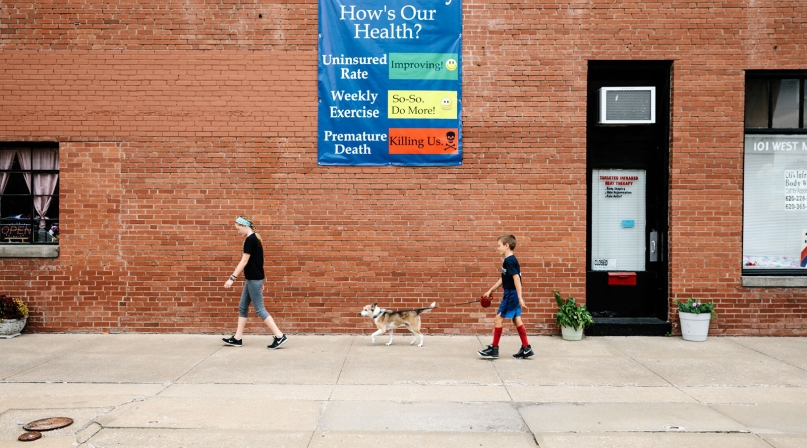Rural Kansas county scores health win
Author

Blaire Bryant
Upcoming Events
Related News

Thrive Allen County helps focus Allen County, Kansas' health gains
In the face of a century of declining population and a spot near the bottom of the County Health Rankings, Allen County, Kan. fought trends and became a new model in rural revitalization, earning the Robert Wood Johnson Foundation Culture of Health Prize in the process.
The prize accompanied a seven-spot climb in the County Health Rankings in 2018, to 84th in the state of Kansas for composite ranking of total health indicators.
Learn More
Allen County was one of eight recipients of the $25,000 Culture of Health cash prizes in 2017.
Central to this progress, the nonprofit Thrive Allen County has built strong partnerships both with and within the community, listened to residents’ concerns and united them under the shared vision for health. The county has spent the last decade advancing efforts that include building and sustaining a robust healthcare safety net, creating a built environment that supports healthy lifestyles and physical activity, and implementing policy changes that address a myriad of issues from drug use to workplace wellness.
“It’s a county that is still working to ensure that its best days are ahead of it,” said David Toland, Thrive’s CEO.
Shared goal, shared vision, shared identity
Allen County’s success was rooted in a widely adopted and accepted mission to become the healthiest rural county in Kansas. County leaders understood that winning community commitment to a shared vision requires a deep understanding of what matters most to the individuals and businesses driving the change. It also required residents to band together under the county’s newly established set of values and priorities.
“It’s the idea that a rising tide lifts all boats. I really think that Allen County lives by that,” said Lisse Reghr, Thrive’s deputy director of outreach and advocacy.
The organization functions as convener, building strong partnerships both with and within the community, listening to their concerns, and uniting them under the shared vision for health. Toland said that building the foundation for trust and understanding amongst community members was a key factor in some of the county’s most notable wins. For example, in 2010, Thrive Allen County successfully promoted the first successful sales tax increase in 40 years, a quarter-cent increase to fund construction of a new hospital. Today, the 25-bed, state of the art hospital serves as a critical access facility, providing comprehensive healthcare and 24-hour emergency care services.
Working across sectors
Commissioner Thomas Williams credits Thrive with building bridges within the county and bringing sectors together.
“Having a culture of health in a community almost by definition means it’s not just about the healthcare sector,” Toland said. “It’s about the community, which includes business, which includes the public works department, which includes social services.”
Thrive also worked across city lines and helped break down municipal siloes. Williams acknowledged the challenge.
“The city of Iola wouldn’t talk to the county, [the city of] Moran wouldn’t talk to [the city of] Humboldt,” he said. “We weren’t getting along.”
The organization petitioned businesses and city and county governments to get onboard by explaining the benefits of a collective impact approach and how it can profit all parts of a community.
Allen County became a champion for community change by supporting public initiatives in unprecedented ways. In 2015, commissioners allowed Iola Industries to purchase a portion of the old hospital site and begin one of the largest redevelopment projects undertaken in the county in decades. The project involved the construction of a mixed-used development facility that included apartment units, townhomes, and the addition of a new supermarket initiated with the help of community petitions. The supermarket opened in January 2018 in what was once designated by the U.S. Department of Agriculture as a food desert, adding 50 jobs.
Toland points to Williams as a difference-maker. Williams joined the Allen County Board of Commissioners in 2013, after serving as sheriff since 2005. As both commissioner and sheriff, Williams has promoted a culture of health. After 38 years in law enforcement seeing offenders struggle with drug addiction, he started Allen County’s first drug court, which integrated treatment into the adjudication of drug cases.
He views the support of community-based collaborative initiatives like the drug court as a part of his role as an elected official.
“That’s our whole job,” he said. “Almost everything that we do affects each one of our citizens in one way or another. It’s walking that fine line trying to figure out how you can make everybody’s lives in your community better.”
Shifting momentum post-win
Winning the Culture of Health Prize last fall validated the nearly decade’s worth of work, on top of the improved health outcomes for residents. An evolution has taken place in the community, not only in the approach to health initiatives, but how people view their individual roles in advancing these initiatives. For Thrive Allen County, it meant interpreting the data in a different way.
“We use the County Health Rankings differently now than we did when we started,” Toland said. When the first County Rankings were released in 2009, the county was ranked 94th out of 105 counties in Kansas in the composite ranking of total health indicators. The county set a goal of achieving a ranking of 85th or better by 2015. Despite having reached this goal five years later, the county slipped back down to 86th the following year.
That’s when Toland says they recognized the need for a shift in perspective. Now the county tries to remain focused on the “bigger picture of what’s happening from year to year” and concentrate on metrics on which they can make an immediate impact. Metrics, such as the county uninsured rate, which was cut to 10 percent from 21 percent over four years.
For the residents, it’s about maintaining the momentum. The success of previous efforts has provoked a spirit of volunteerism and engagement in the community.
“I think people really want to see action,” Toland said. “They want to see things that are big, and if you can inspire them with these big ideas, then they will join that movement and support it.”
Thrive plans to continue to engage various county sectors and community partners to develop a strategic plan to address emerging health issues and community concerns. He mentions, “We don’t know [what we are going to do] yet, we just know we’re going to do it. And we’re going to do it together.”
Attachments
Related News

HRSA offers funds to aid care transitions for justice-involved individuals
On April 10, the U.S. Department of Health and Human Services’ Health Resources and Services Administration (HRSA) announced the availability of $51 million in funding opportunities open to HRSA-funded health centers. HRSA-funded health centers, which serve over 30 million patients, play a crucial role in county healthcare systems emphasizing equity and accessibility in healthcare. This new initiative focuses on supporting individuals leaving incarceration by providing health services during the critical 90 days before release, assisting justice-impacted individuals with their return to the community by expanding access to primary healthcare—including mental health and substance use disorder treatment.

Join NACo in celebrating County Health Day on April 19, 2024
County Health Day, which falls during National County Government Month, celebrates the pivotal role counties play in promoting public health and building resilient communities.

FCC takes critical steps to improve the 988 National Suicide Lifeline
On March 21, bipartisan congressional leaders and FCC Chairwoman Jessica Rosenworcel announced steps to improve the 988 National Suicide Lifeline. This announcement marks major progress on the nation’s crisis response, a priority for counties and a key policy pillar of the NACo Commission on Mental Health and Wellbeing.